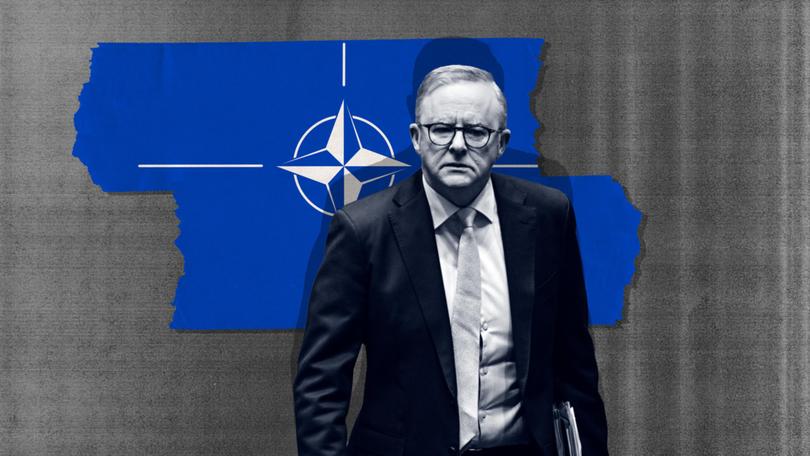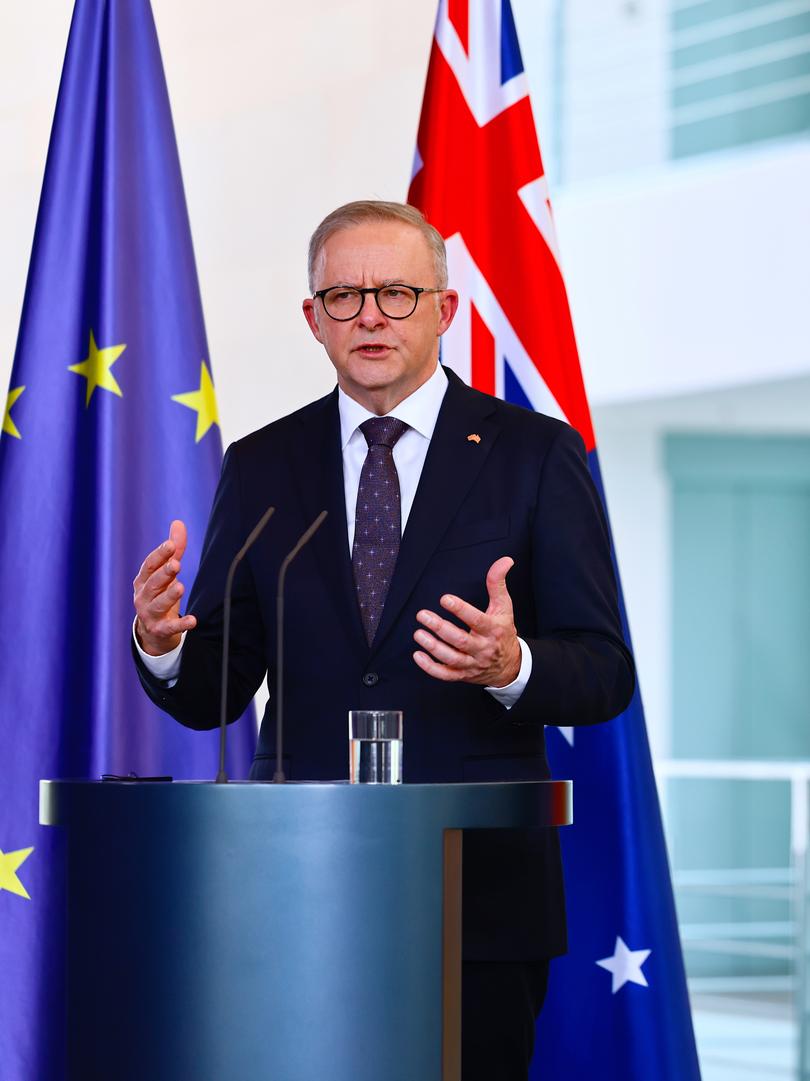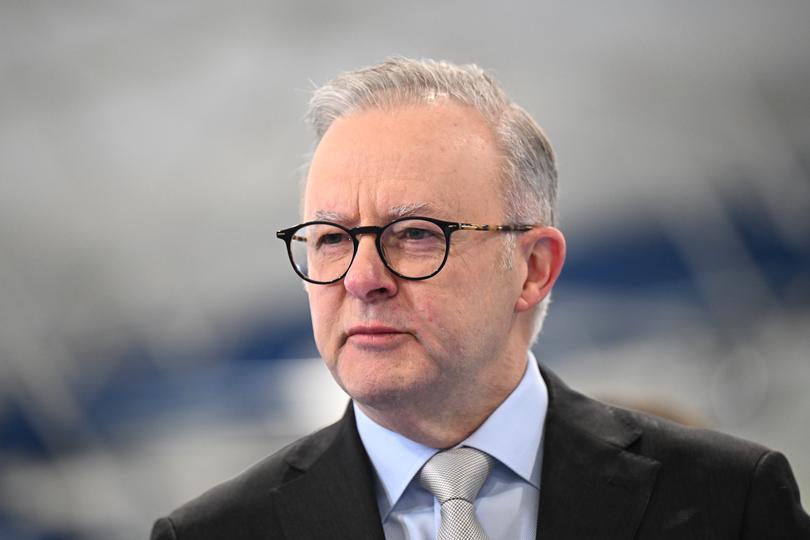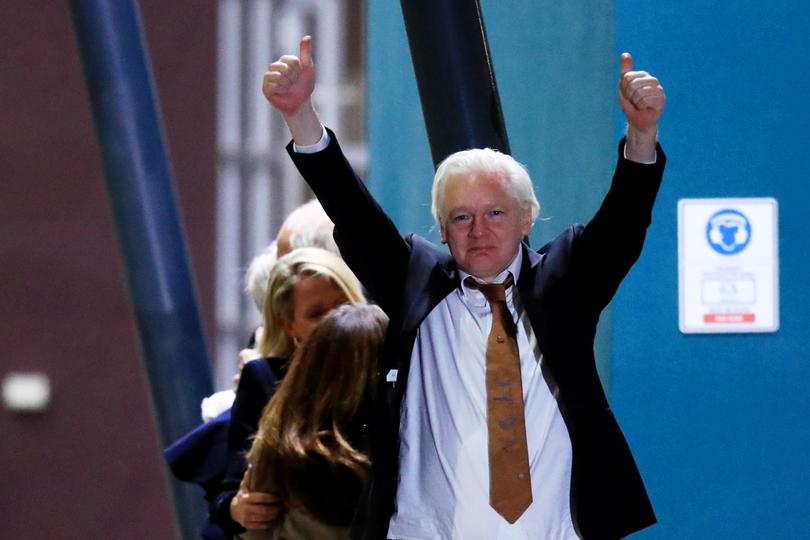LATIKA M BOURKE: Voters deserve to know why Anthony Albanese is refusing to go to NATO summit
LATIKA M BOURKE: The Prime Minister can’t seem to stick to the one excuse for refusing to accept a NATO summit invitation — voters deserve to know why.

Anthony Albanese can’t get his excuses straight.
Last year when the prime minister wanted to skip NATO, he blamed the criticism of his frequent overseas travel as the reason for him wanting to stay home.
After a backlash at home, he agreed to go.
Sign up to The Nightly's newsletters.
Get the first look at the digital newspaper, curated daily stories and breaking headlines delivered to your inbox.
By continuing you agree to our Terms and Privacy Policy.This time it’s the same old story. Once again, Australia’s Prime Minister doesn’t want to show his face at the NATO summit despite a special invitation given to him and three other Indo-Pacific leaders.
The prime minister, who faces re-election sometime within the next 10 months and potentially before the end of the year, is facing an uphill battle, following the surprise rise in inflation last week and the prospect of a pre-election interest rate rise.
Asked by Sarah Ferguson on 7.30 if voters would mark him down on cost-of-living if he attended the Washington summit alongside our AUKUS allies, and European partners, as part of the elite Indo-Pacific four grouping, Mr Albanese was direct: “No.”
He then gave his true reason for his decision.
“I’m not going because we’re not members of NATO,” he said.
Adding insult to injury, he then claimed he only went a first time to meet other world leaders, and the second because he could go to Germany and meet with the beleaguered German Chancellor Olaf Scholz, whose Social Democratic Party is leading a weak and ineffectual three-party coalition.

Albanese claimed that the trip to Lithuania, a former Soviet-occupied state, where he met with Ukraine’s war-time leader Volodymr Zelensky was worth it because he could stop in Germany first and sign a military deal.
Australia is not a member of NATO but it is a partner country and has been invited to the last three summits as part of an Indo-Pacific four (IP4) grouping that includes New Zealand, Japan and Korea. The reason is obvious. China is a threat to global security and NATO wants to work with the leaders of the region to understand and confront the challenges posed by our aggressive neighbour, together.
Australia and NATO have been cooperating since 2005. In 2012, the Labor Government of which Mr Albanese was a part, signed a political declaration to formalise their relationship.
In seeking political cover for his snub, Mr Albanese then claimed he was simply following suit, the Liberals sent Marise Payne, a foreign minister to the summit in 2018. This year Deputy Prime Minister Richard Marles will attend the leader’s summit instead of Mr Albanese.
This is a flimsy defence for three reasons.
Firstly, NATO’s decision to invite IP4 leaders only began in 2022 — the year Albanese was elected Prime Minister and the same year NATO declared China a “security challenge” for the first time.
Secondly, in 2018 the security climate was not the same as where the global community and Australia’s role in it find itself.
In 2018, the COVID-19 pandemic that originated in Wuhan China had not yet infected the world and caused the mass hardship caused by the resulting economic shutdowns.
Australia had not been subjected to China’s vicious decision to single out particular trades for vengeful punishment which it did by whacking enormous tariffs on Australian wine, coal, lobster and barley following the former government’s request to investigate the origins of the pandemic.
Thirdly, Vladimir Putin had not launched his illegal full-scale invasion of Ukraine.
Australians understand that preserving global security means shoring up our prosperity, trading relationships and safety. They can see the pictures of Putin strapping in for a car ride with North Korea’s Kim Jong-un and sense the European conflict edging closer to our region. They understand that at any point in time, China could urge Putin to lay down his arms, but chooses instead to encourage global instability by funding his war effort through the export of goods that can be used for domestic and wartime purposes.
“Right now there are changes – the likes of which we haven’t seen for 100 years – and we are the ones driving these changes together,” Xi told Putin after a visit to the Kremlin last year.
If Putin and Xi succeed in changing the world, Australia and her allies don’t prosper in that equation.
This is why NATO and Australia’s inclusion in its meetings are of utmost importance to us and recognise the indivisibility of the security threats faced by Europe and by our region.
You don’t take my word for it. Take it from the person who said this:
“It is essentially the meeting globally of the world’s democratic leaders … whilst the focus is obviously on the North Atlantic and Europe, many of the principles are applicable globally.
“The Russian invasion of Ukraine is a reminder that something that happens in one part of the world affects everywhere in the world. Russia is not alone in challenging the rules that underpin global security and prosperity.”

Any guesses as to who said those words? The answer is Anthony Albanese — after last year’s NATO summit.
Guess what he also said?
“Anyone who thinks that what happens in Europe doesn’t affect what happens here is ignoring the direct impact of inflation on our economy and our supply chains of the Russian invasion of Ukraine. It’s had a very direct effect on our economy and our cost of living.”
Hear hear. Couldn’t have said it better myself PM.
So what has changed his mind?
It is unfortunate and inescapable for Albanese that those who have previously professed the ‘not-members-of-NATO’ view are the Chinese Communist Party, and prominent Labor figures Paul Keating and Bob Carr.
The CCP’s mouthpiece, China Daily, regularly rails against what it sees as Nato “meddling” in its region and quotes Keating to make its case. When news broke that Albanese was skipping the summit, Russian state media, Sputnik, gleefully reported the development.
Compare the Government’s approach to NATO to the energies devoted to freeing Julian Assange, who committed espionage against our ally the United States.

Albanese ordered his hand-picked ambassadors Kevin Rudd and Stephen Smith to secure his freedom. The pair then personally escorted Assange home from London to Canberra and Albanese gave him a welcome-home phone call.
Whilst there is general agreement that Assange’s case had dragged on for too long and he had served his time for his now-confessed crime, the Government time and effort awarded to Assange, and his hero’s welcome, are in stark contrast to the Prime Minister’s stay-at-home approach when it comes to Labor’s approach to global security.
This is set against a long line of weakened responses when it comes to our national security, the failure to raise directly with his Chinese counterpart the attacks on our Navy divers and helicopter pilot, the slowing of military aid to Kyiv and the repeated no-shows at summits dedicated to Ukraine’s rebuild and eventual peace.
Either Albanese has succumbed to their pressure and established a price for his so-called ‘stabilisation’ China policy, or he’s willing to put his personal electoral interests ahead of national and global ones.
Neither are good excuses and he should tell us which one it is.

